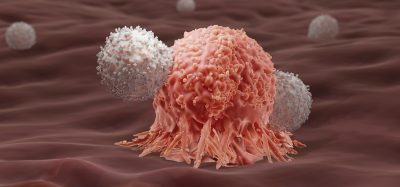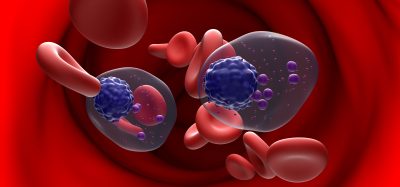DFG €66 million funding for 15 new research training groups
Posted: 22 May 2017 | Niamh Marriott (Drug Target Review) | No comments yet
The Deutsche Forschungsgemeinschaft (DFG, German Research Foundation) is establishing 15 new Research Training Groups to further support early research…


The Deutsche Forschungsgemeinschaft (DFG, German Research Foundation) is establishing 15 new Research Training Groups to further support early career researchers in Germany. They include two International Research Training Groups with partners in Australia and China.
This was decided by the relevant Grants Committee during its spring session in Bonn. The collaborations will be funded for an initial period of four and a half years. During this period they will receive approximately €66 million in funding, including a 22% programme allowance for indirect costs arising in each research project. In addition to the new groups, the Grants Committee approved the extension of five Research Training Groups for another four and a half years.
Current funding
Research Training Groups offer doctoral researchers the opportunity to complete their theses in a structured research and qualification programme at a high academic level. In total the DFG is currently funding 213 Research Training Groups, including 40 International Research Training Groups; the 15 new groups will commence their work as of September 2017.
In addition to funding decisions, the Committee addressed basic questions relating to the Research Training Group programme, particularly the qualification measures which go beyond the specific research topic.
“The DFG believes it is extremely important to distribute financial resources in accordance with uniform standards. Funds for transferable skills training, which allows doctoral researchers to acquire expertise beyond a given research topic, should therefore continue to be available,” DFG Secretary General Dorothee Dzwonnek said.
The new Research Training Groups (in alphabetical order by their host universities, including the name of the applicant universities):
- UNRAVEL – UNcertainty and Randomness in Algorithms, VErification, and Logic
The need to deal with uncertainties is ubiquitous in computer science. For example, applications process large volumes of data from often unreliable sources such as non-trustworthy websites. Data may also be subject to continuous changes, exist in different formats, or be incomplete. Key techniques in this regard include probabilistic modelling – a form of description that explicitly models uncertainties – and randomisation, the use of random processes in calculations. The Research Training Group “UNRAVEL – UNcertainty and Randomness in Algorithms, VErification, and Logic” intends to advance the probabilistic modelling and analysis of uncertainty by developing new theories, algorithms and verification techniques and apply them to security, planning and performance analysis.
(Host university: RWTH Aachen University, Spokesperson: Prof. Dr. Joost-Pieter Katoen)
- Energy, Entropy, and Dissipative Dynamics
The research projects of the Research Training Group “Energy, Entropy, and Dissipative Dynamics” are concerned with various models in physics, materials sciences and geometry, as used for example to describe gas dynamics or network flows. The linking element is the examination of energy and entropy functionals, which allow the fundamental parameters of the systems under examination to be described, and whose temporal relationship serves as a tool to study the properties of a model and the permissible dynamics. The doctoral researchers will investigate the research questions using analysis, modelling and numerics in the area of nonlinear partial differential equations and applied analysis.
(Host university: RWTH Aachen University, Spokesperson: Prof. Dr. Michael Westdickenberg)
- Tight Junctions and Their Proteins: Molecular Features and Actions in Health and Disease
“Tight Junctions and Their Proteins: Molecular Features and Actions in Health and Disease” are the focus of a Research Training Group of the same name. Tight junctions (TJs) connect adjacent cells of surface structures of the body such as in the skin, as well as inside the body, and perform an important barrier function. By regulating their permeability, they control the transport of substances to essential organs like the intestines and kidneys. The group intends to expand our knowledge of the composition, structure and function of TJs at the molecular level, analyse the development and control of TJs in various tissues and investigate in more detail the role of TJs in the pathophysiology of intestinal diseases.
(Host universities: Free University of Berlin and Humboldt University of Berlin, Spokesperson: Prof. Dr. Jörg-Dieter Schulzke, Charité – University Hospital Berlin)
- Crossing Boundaries: Molecular Interactions in Malaria
Malaria is caused by single-celled parasites known as Plasmodium, which are transmitted by the bite of the Anopheles mosquito. Some basic principles of the progress of the disease and parasite-host interactions are still not understood. The German-Australian International Research Training Group “Crossing Boundaries: Molecular Interactions in Malaria” will therefore investigate the molecular mechanisms of Plasmodium infections as a basis for strategies to develop new drugs and immunisations for improved malaria treatment and prevention.
(Host university: Humboldt University of Berlin, Spokesperson: Prof. Dr. Kai Matuschewski; Cooperation partner: Australian National University, Australia)
- The Macroeconomics of Inequality
In many developed economies, differences in wealth and income have strongly increased in recent decades. Although growing economic inequality occupies a prominent place in public debate, little research has been carried out into the economic implications of this trend. The Research Training Group “The Macroeconomics of Inequality” therefore intends to document the many different dimensions of this inequality and understand the causes of growing inequality. In a second stage they will examine whether macroeconomic crises spread differently in unequal societies and whether inequality creates new channels through which microeconomic crises acquire macroeconomic relevance.
(Host university: University of Bonn, Spokesperson: Prof. Dr. Christian Bayer)
- Contemporary/Literature. History, Theory, and Praxeology
The scholarly examination of contemporary literature is currently very popular. The question as to what constitutes contemporary literature is posed in terms of the history of literature primarily as the question of the limits of an epoch. The Research Training Group “Contemporary/Literature. History, Theory, and Praxeology” intends to study the dimensions of the concept of contemporary literature in more depth for the first time and analyse it on a comparative European basis. In so doing, the group aims to develop a history of the legitimation, actualisation and transformation of concepts of the contemporary and thus contribute to the establishment of historically and theoretically reflective contemporary literature research.
(Host university: University of Bonn, Spokesperson: Prof. Dr. Kerstin Stüssel)
- Geo-Ecosystems in Transition on the Tibetan Plateau (TransTiP)
The Tibetan Plateau is of major importance for the global water, energy and element cycles. At the same time it is one of the most endangered geo-ecosystems in the world, with rapid climate warming, seasonal variation in precipitation and an increase in land use accelerating material flows on the Earth’s surface, affecting the carbon sink potential of soils and impacting on water supplies and water quality. The International Research Training Group “Geo-Ecosystems in Transition on the Tibetan Plateau (TransTiP)” intends to study water resources and species composition on the Tibetan Plateau in the context of global climate change. They aim to do this primarily through detailed analysis of changes in material flows on the Earth’s surface, including sediments, carbon and water.
(Host university: University of Braunschweig, Spokesperson: Prof. Dr. Antje Schwalb; Additional applicant universities: University of Hanover, University of Jena; Cooperation partner: University of Lanzhou, China)
- Resolution of Inflammation – Mediators, Signalling and Therapeutic Options
In medicine today, the triggering of inflammation in the body is understood as an active process. The Research Training Group “Resolution of Inflammation – Mediators, Signalling and Therapeutic Options” aims to discover how the resolution of inflammation is activated and controlled and what signal cascades are involved. The participating researchers will study the signals of dying cells and phenotype change in immune cells as well as the restoration of barriers in the context of inflammation resolution. Their aim is to better understand the principles of faulty resolution in acute and chronic inflammatory diseases.
(Host university: University of Frankfurt am Main, Spokesperson: Prof. Dr. Bernhard Brüne)
- MeInBio – BioInMe: Exploration of Spatio-Temporal Dynamics of Gene Regulation Using High-Throughput and High-Resolution Methods
The Research Training Group “MeInBio – BioInMe: Exploration of Spatio-Temporal Dynamics of Gene Regulation Using High-Throughput and High-Resolution Methods” will investigate how the genetic information in a DNA sequence presents itself. How do individual cells adapt to specific stages of differentiation? How does the transcription programme of single cells differ from programmes of apparently the same form which have been decoded by studying cell populations? To answer these questions, the Research Training Group intends to use high-throughput sequencing to adapt established methods to small numbers of cells and single cells.
(Host university: University of Freiburg, Spokesperson: Prof. Dr. Tanja Vogel)
- Enrichment of European Beech Forests with Conifers: Impacts of Functional Traits on Ecosystem Functioning
In many places, forests are composed of a mix of native tree species and those which have been cultivated outside their natural area of distribution. The Research Training Group “Enrichment of European Beech Forests with Conifers: Impacts of Functional Traits on Ecosystem Functioning” will study the impact of such mixes on ecosystem functioning. The researchers will also examine the widespread assumption that the presence, distribution and variability of functional traits of species are more important to ecosystem functioning than species diversity per se.
(Host university: University of Göttingen, Spokesperson: Prof. Dr. Christian Ammer)
- Dynamics of Conventionality (400–1550)
The medieval period is often described as a deficient preliminary stage to the modern period, partly because its social and cultural manifestations are considered to be particularly traditional and conventional. The Research Training Group “Dynamics of Conventionality (400–1550)” will investigate the dynamics of European medieval societies and cultures by applying a concept of convention which essentially encompasses all forms of social agreement. Accepted social and artistic rules, although claiming to be normative, were nevertheless subject to constant processes of negotiation, reinterpretation and fictionalisation and were sometimes even dismissed as bad habits.
(Host university: University of Cologne, Spokesperson: Prof. Dr. Udo Friedrich)
- Statistical Modelling in Psychology (SMiP)
The Research Training Group “Statistical Modelling in Psychology (SMiP)” aims to forge a link between traditionally loosely connected areas of psychology – research in the basic and applied disciplines of psychology on the one hand and the latest developments in methodology and statistical modelling on the other. To this end, the group will develop statistical models as a framework for the formalisation of psychological theories and research questions. Researchers from five institutions are joining forces to address this small but important working area in psychology.
(Host university: University of Mannheim, Spokesperson: Prof. Dr. Edgar Erdfelder; Additional applicant universities: University of Freiburg, University of Heidelberg, University of Koblenz-Landau, University of Tübingen)
- Expectation Maintenance vs. Change in the Context of Expectation Violations: Connecting Different Approaches
Expectations – defined as conditional predictions of future events in the form of ‘if X then Y’ hypotheses – are often maintained even after being empirically disproved. This phenomenon, known as “expectation persistence”, has already been observed and described in widely differing research contexts. In social psychology, for example, prejudices against another group were shown to persist in spite of positive experiences with members of this group. An integrative approach to these aspects of human behaviour is lacking, however, which is why the Research Training Group “Expectation Maintenance vs. Change in the Context of Expectation Violations: Connecting Different Approaches” will address the phenomenon of expectation persistence.
(Host university: University of Marburg, Spokesperson: Prof. Dr. Mario Gollwitzer)
- Advanced Medical Physics for Image-Guided Cancer Therapy
Cancer is an important challenge to modern societies. A combination of new imaging and computer-assisted techniques with advanced therapeutic strategies offers a key to early diagnosis, precise tumour characterisation and successful treatment. In the Research Training Group “Advanced Medical Physics for Image-Guided Cancer Therapy”, doctoral researchers in the natural sciences and medicine will collaborate to improve image-based cancer therapy.
(Host university: LMU Munich, Spokesperson: Prof. Dr. Katia Parodi; Additional applicant university: Technical University of Munich)
- Chemical Bond Activation
The Research Training Group “Chemical Bond Activation” will focus on the activation of normally fairly non-reactive hydrocarbon compounds. In so doing, they aim to develop an in-depth mechanistic understanding of selected bond activation reactions. Understanding bond activation has relevance in many industrial and ecological applications.
(Host university: University of Oldenburg; Spokesperson: Prof. Dr. Sven Doye)
Related topics
Funding, Molecular Biology, Molecular Modelling, Molecular Targets, Protein, Protein Expression, Proteogenomics, Proteomics, Target Validation, Therapeutics
Related organisations
Australian National University, Cologne University, Free University of Berlin, German Research Foundation (DFG), Humboldt University of Berlin, RWTH Aachen University, Technical University of Munich (TUM), University of Bonn, University of Braunschweig, University of Frankfurt am Main, University of Freiburg, University of Göttingen, University of Mannheim, University of Marburg, University of Oldenburg
Related people
Dorothee Dzwonnek








